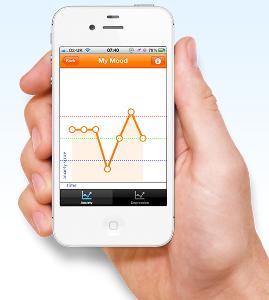Early success for free iPhone app for people with depression
Release Date 12 October 2012

Psychologists at the University of Reading have launched a free iPhone app to help people with depression find access to treatment, without needing to go to their GP.
Developed as part of a PhD research project, the app, called Mood Mate, is available for download now.
It was launched on October 10, World Mental Health Day, but has already had early success, with more than 1,500 downloads, a #3 ranking among free Health & Fitness apps, and received Twitter recognition by Alistair Campbell, Tony Blair's former spokesman who now campaigns on mental health.
The free app will help people monitor their own mood and will help detect signs that they are becoming depressed or anxious. If the app finds a person could benefit from help, it will point them towards local treatment services, often ones that they can access without first going to their doctor.
Part of a PhD research programme funded by the Medical Research Council and the Economic and Social Research Council, the Mood Mate app collects data anonymously to analyse whether monitoring mood over time helps people seek treatment - contributing to crucial research which could help health authorities provide better treatments in the future.
The app was created by University of Reading student Alex Gyani, a PhD student in the Department of Psychology, who has been working to develop the app with programmers and developers at Reading, including Jack Rostron, an undergraduate in the School of Systems Engineering.
Alex said: "Having a randomized controlled trial built into an app that is available on the iTunes store is a fantastic way to conduct research and the more participants we can recruit, the more we will learn. That's why an app is such a great way to conduct a trial like this one.
"We hope it will enable us to find new ways to help people suffering from mental health problems in the UK get the psychological treatments that have been shown to work."
More people than ever are suffering from stress, anxiety and depression. National surveys have found that 1 in 6 people could be suffering from a common mental health disorder at any given time. But many people are not accessing treatment that has been shown, in clinical trials, to be effective.
The Mood Mate app is designed to help increase the number of people who access psychological therapies in the UK. The government has spent £400 million on its Improving Access to Psychological Therapies (IAPT) initiative since 2007, including training 6,000 new therapists in Cognitive Behavioural Therapy (CBT). These treatments work, with one study showing that more than half of patients recovered and stayed well.
But the NHS is not treating as many people as it budgeted for. Some GPs are not referring patients to mental health services and some patients do not disclose these issues to their GPs, preferring more informal routes. The Mood Mate app is designed to help people decide if they need help and give them the information they need to refer themselves to local mental health treatment services, rather than having to go through a GP.
Mood Mate is available to be downloaded free from iTunes now.
ENDS
For more information, please contact Pete Castle at the University of Reading press office on 0118 378 7391 or p.castle@reading.ac.uk or Alex Gyani on 07734 106988 or a.gyani@pgr.reading.ac.uk.
Notes to editors:
More information on is available from the Mood Mate website.
The Department of Psychology at the University of Reading has established itself as a leading centre for teaching and research, with internationally recognised experts working in a diverse range of areas including clinical, developmental, health, cognitive and social psychology and neuroscience.
The University of Reading is also home to the Charlie Waller Institute, an award-winning centre that conducts training and research on evidence-based psychological treatments.